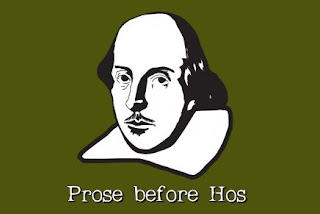
We devoted the first six weeks of Intro to English Studies II to the study of poetry, and rounded out our consideration with a look at two Canadian poets and poems, both of which examine the role of poetry in the twentieth century. (The poems in question are A.M. Klein's "Portrait of the Poet as Landscape" and Irving Layton's "Whatever Else Poetry is Freedom".) Both seek to examine the state of poetry, particularly in Canada, with very different results. Klein rages against the obsolescence of poetry, which he describes as being like the fletcher's craft, where Layton paints the poet as a fool or buffoon.
For our last seminar, we asked the students to respond to Layton and Klein, to reflect on what they thought the state of poetry was, and on the role that poetry should play in English Studies at both the secondary and post-secondary levels. My students don't know what to make of poetry. They don't think it's dead, per se, but they don't know what to do with it. An educated person should know poetry, they agree. And music is poetry, but only sometimes. Only if it is real, or genuine, or has meaning behind it. They're reluctant to tell me how meaning is created--they just know. If meaning is conflated with authenticity, I ask, does that mean that Real Poetry must also be authentic to be meaningful? They're not sure, but a few of them wonder if that's why they don't like some of what we've studied. It doesn't mean anything to them.
They stare at me blankly when I tell them that I like poetry, that I even own books (plural!) of it. I hope that some of them leave this year with an understanding that poetry does something. That it makes you feel. Just like music can, only you have to work harder for ir.
I read a piece that a fourth year student submitted to our Creative Writing Exhibition. It was actually a prose piece, but it spoke of finding TS Eliot, and finding friends. One of the things that I miss most about undergrad si discovering poetry for the first time. I don't remember starting university with any particular love for poetry, but I do remember what it felt like to read some of those poems for the first time, the tiny frisson of excitement in my abdomen.
The poem I remember most from my first year of university is Wallace Steven's "Thirteen Ways of Looking At A Blackbird." I know that we read other things--"Goblin Market", some Atwood, some Auden--but it is Stevens that sticks in my mind, it is Stevens who made me think This Is Poetry for the first time. The poem does everything that it does so simply, but so well, while so actively defying linear interpretation. It was unlike anything I'd ever read before.
The next year was the British Literature survey year, which brought even more poetry: "Dover Beach," "The Waste Land," "Dulce Et Decorum Est", "The Pomegranate."
And into third year: "Sed Non Satiata," "The Lady's Dressing Room," "Brebeuf and his Brethren". Oh, and Prufrock.
Prufrock.
In a lot of ways, Prufrock is why I'm in English Studies. I'm not an Eliot scholar, nor even a poetry specialist, but Prufrock was a revelation to me. When I read it for the first time, it was the apex of everything that I was learning to love about poetry; for me, it manages to be both alpha and omega. Every time I write, I am not as good as Prufrock, but every time I write I have that summit to strive for.
As a teacher, I want to be the person who introduces someone to his or her Prufrock. I want to see someone realize that poetry is not in fact dead, or archaic; I want to see someone realize that poetry has both meaning and life, that there is somewhere to go from here.
Whatever else, poetry is freedom. (Words Layton's, but the comma is mine.) Writing poetry is freedom, but so is reading it.
1 comment:
Here's an essay on a young poet's journey through craft and the lessons learned along the way. Please read it at http://wp.me/pC3Xj-dK
Post a Comment